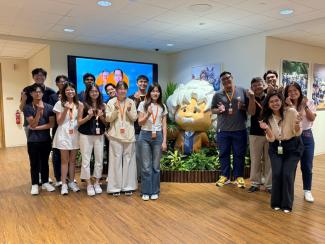
Singapore Management University (SMU) has deepened its long-standing partnership with Salesforce to equip undergraduate students with in-demand skills in Salesforce technology.
This partnership builds upon SMU’s pioneering relationship with Salesforce, which began in 2015 when SMU became one of the first universities in the Asia-Pacific region to integrate Salesforce’s platform into its curriculum.
The collaboration takes on added significance as Salesforce has, on March 12, announced that it plans to invest US$1 billion in Singapore over the next five years to accelerate the nation’s adoption of Agentforce, naming SMU as one of the Institutes of Higher Learning that Salesforce is collaborating with as part of their broader investment in Singapore’s digital future.
Objectives
The memorandum of understanding (MOU) for this partnership, signed in October 2024, seeks to equip SMU students with in-demand Customer Relationship Management (CRM) and Artificial Intelligence (AI) skills through training and certifications, including AI Associate and AI Agentforce Specialist, and connecting them with employment opportunities.
This move further cements a 10-year collaboration between SMU and Salesforce to give SMU students the opportunity to become fluent with the leading AI CRM software globally.
Hands-on Learning to Earn Real-World Experience
Under the MOU, key areas of collaboration include the enhanced use of the Salesforce platform in the curriculum to provide more hands-on experience and support for students to achieve recognised Salesforce credentials that boost their employability.
Salesforce professionals would also share real-world insights and offer students access to career resources, mentorship, and internship opportunities with Salesforce and its partners in the Salesforce ecosystem.
Said the Dean of SMU’s School of Computing and Information Systems (SCIS), Professor Pang Hwee Hwa: “Our partnership with Salesforce gives students the skills, certifications, and hands-on experience they need to stand out in today’s competitive job market. This approach of combining classroom learning with real-world applications has been effective in helping our graduates stay ahead in the fast-changing digital economy.”
“We are honoured to continue our long-standing partnership with SMU to ensure our workforce is equipped for the jobs of the future. We are in the midst of a digital labour revolution and the rise in agentic AI - AI systems that can operate independently, making decisions and performing tasks without human intervention,” said Sujith Abraham, Senior Vice President & General Manager, Salesforce ASEAN.
“Agentic AI is reshaping the skills required in the workplace. Businesses like Salesforce have a part to play in building an agent-ready workforce by providing students the platform to hone their skills and access to a community that opens employment opportunities,” he elaborated.
Aligned with Industry
In 2018, SCIS introduced a track elective called Managing Customer Relations with Analytics. It incorporates Salesforce Trailhead, a free learning platform. To date, over 1,300 students have taken the module.
The MOU will expand the existing collaboration with curated learning paths, certifications, and hands-on industry exposure. For example, the SCIS has developed tailored Trailmix curricula – offering hands-on projects to complement the theoretical foundations taught in the module on Managing Customer Relations with Analytics – ensuring students gain a structured learning experience aligned with industry needs.
To sharpen their edge, SCIS students are also encouraged to obtain recognised Salesforce credentials as they have distinct advantages. For instance, hands-on training is validated by Badges, applied knowledge is demonstrated by Superbadges, and career advancement is a direct benefit of certifications in the latest Salesforce skills.
Besides Salesforce, other long-standing partners from the banking, technology and government sectors that have been working with SCIS to enhance students’ tech fluency in real-world settings include UBS, Google, Amazon Web Services and GovTech.